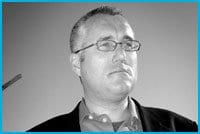In 1998 RM vaughan had an affair with the psych-iatrist he’d been receiving treatment from for two years. Shortly after terminating their professional relationship so they could be together the psychiatrist abruptly ended the affair. Shattered by the experience Vaughan reported the doctor’s misconduct to the Ontario College of Physicians and Surgeons who revoked the psychiatrist’s licence in 2000. When the College reinstated the psychiatrist’s licence in 2005, Vaughan decided to pick up a pen.
“Rage was my first inspiration,” says Vaughan, a Toronto writer, filmmaker and arts critic. “But it soon became more of an unfolding series of questions, from me to me. Why did I do that? How did I let that happen? What was in his mind? I did not set out to forgive… but the funny thing about revenge is that it isn’t very fulfilling in the long run.”
Although he had written an article on the subject for Toronto Life magazine in 2000 Vaughan also felt compelled to write a memoir of the experience. Despite being a gifted writer of prose he chose to write Troubled as a book of poetry.
In the memoir, Vaughan calls poetry “the second-best silence” and “a broken knife outmoded as telegrams.” So why use it for such an important story? “If I had any brains, I would have written a nonfiction memoir,” says Vaughan. “I have no misconceptions that this will be a bestseller. I guess it’s that the subject, an eternal one, of foolish love is a poetic trope I know all about. Also I suspect because I write art criticism and celebrity interviews for money I wanted to do something removed from those worlds.”
Launching this spring with Coach House Books, Troubled is a gripping collection of Vaughan’s poems, interspersed with letters between Vaughan and the College of Physicians, quotes from books on sexual misconduct in the Canadian medical profession and monologues from several of Vaughan’s films. Vaughan is a master of style and, as always, his poems take us from one unexpected place to another.
Troubled begins at the beginning, with poems covering the two years Vaughan was in psychiatric care. What’s immediately striking is the poet’s ability to blend the mundane with the highly poetic, sometimes inverting the two. With 16 pieces, all entitled simply “Session,” Vaughan details his therapy sessions, his impressions of fellow patients and his growing feelings for Dr M- (as his psychiatrist is referred to in the book), all with a brilliant mixture of unadorned diary-entry descriptions and the heightened language of allusion and metaphor.
What follows are two brief sections about the affair, the “breakup on a park bench” poem, the investigation, the hearing and sentencing, and the reinstatement of Dr M-‘s licence.
In theory the book traces a clear narrative of events in Vaughan’s life. But what gives Troubled much of its strength are the observations Vaughan makes outside of his own life, his observations as a poet looking at the bigger picture. Vaughan accomplishes this with his trademark ability to come at sadness sideways, to catch you with a heart-stabbing image when you’re busy laughing your ass off. Lines like “it’s all so CBC” and “if only I’d been fucked by a Kennedy” are not usual fare in a memoir about abuse and therefore grab readers from an entirely different angle.
There’s also hilarity in the fact that Dr M- gave a literary person like Vaughan a copy of The Seven Habits of Highly Effective People, the risible self-help bestseller from 1989. We laugh along with Vaughan’s poetic response but are unnerved bit by bit as he catalogues evidence of previous readers on various pages throughout the book. The poem ends with a jarring entry scribbled in a margin: “he will liy so you now but be OK? he liys like a bastard dog/ like all the carpets in the castle/ he’s a smart watcher so watch back! Be OK.”
Vaughan’s memoir is clearly one man’s story of surviving and forgiving abuse. It’s also a well-founded indictment of the politics of psychiatry, a medical practice that, as Vaughan states in Troubled, “allows abusers to continue to work their evil magic.” But it becomes something else as well — a metaphor for those moments when we become victims and later ask ourselves how we could be as stupid as other people.
“My hope,” says Vaughan, “is that the book will appeal to anyone who has ever made a huge mistake, been caught in a malevolent system or wondered how their decision-making abilities could be so impaired — which is, I’m thinking, just about everybody. Conrad Black might like it. Maybe I’ll send one to his prison.”

 Why you can trust Xtra
Why you can trust Xtra


